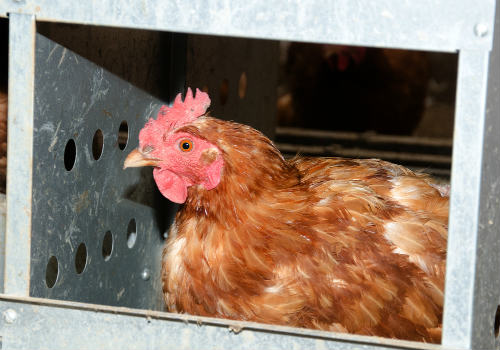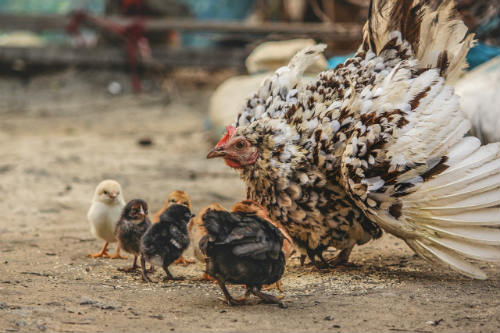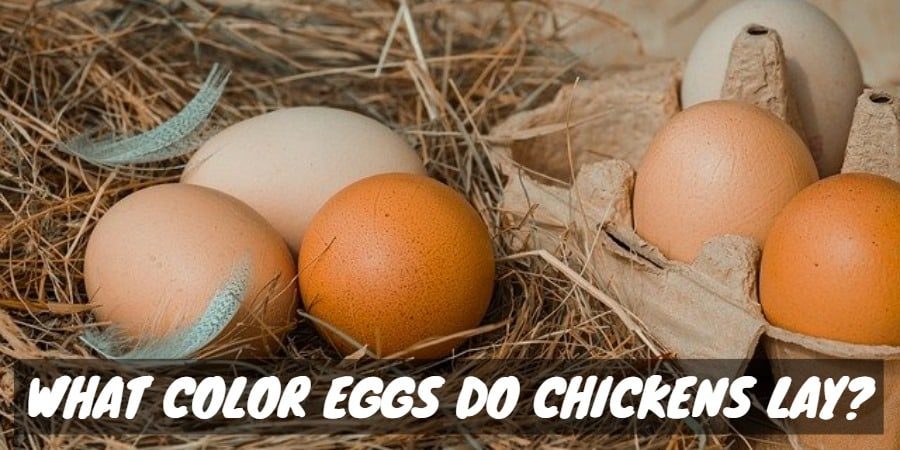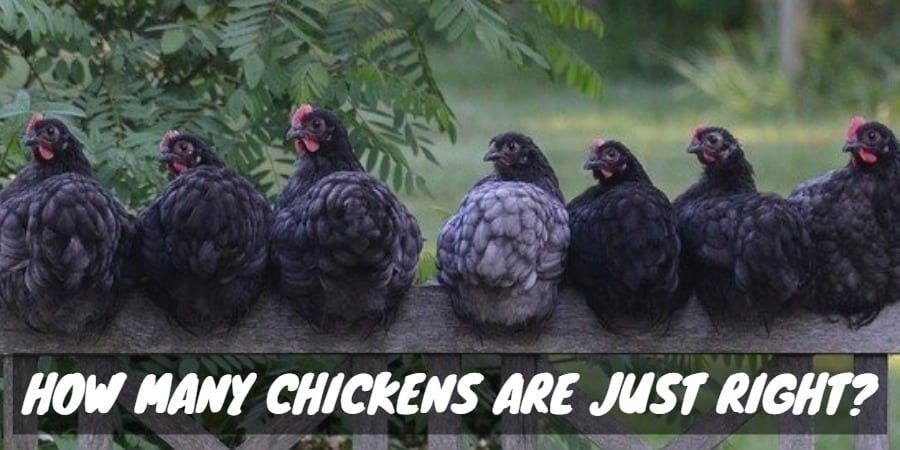It takes 21 days for chicken eggs to hatch, and a brooding hen will sit on the eggs for that entire period. During that time the hen will not lay any more eggs and may become aggressive or defensive of her eggs.
When a hen becomes broody, she doesn’t want to do anything but sit on a nest. It’s interesting to note that a chicken doesn’t need to have laid an egg to become broody. In fact, some hens are known to brood over the eggs of other hens or even egg-like objects like stones.
If you want your hen to brood over eggs and hatch them, this is good news. Broody hens will happily sit a nest with many eggs, allowing you to hatch multiple chicks at one time without needing to incubate them yourself.

How Many Eggs Can a Chicken Sit on to Hatch?
Hens like to lay their eggs in enclosed safe places separate from where they sleep at night. In a chicken coop, that usually means a nest box designed for that purpose. If you keep hens for eggs, you’ll notice quickly that they have a tendency to share nest boxes. This is why you’ll sometimes find multiple eggs in a single nest.
Chickens are social animals, and they are naturally inclined to raise their chicks communally. This means that a mother hen has no problem sitting on and hatching eggs laid by other chickens in addition to her own.
Left to her own devices, a broody hen may lay several eggs of her own and sit on them along with any others that happen to be in the nest or that get slipped under her by her owner.
As long as the eggs are proportional to her body, a hen can brood up to a dozen eggs at a time. In other words, a bantam can brood 12 bantam eggs but fewer full-size eggs. Depending on the size of the nest box or brooding area you have set up for the hen, a dozen eggs could cause crowded conditions and lead to possible breakage. Be sure to give the mother hen plenty of room to stretch.
Why Do Chickens Sit on Eggs?
Hens, like most birds, incubate their eggs with body heat. This is important because eggs need warmth for the embryo inside to develop. Since the chicks are growing inside an egg rather than inside the mother’s body, the eggs must be kept warm and protected.
To facilitate keeping her eggs warm, a broody hen will pull out the feathers on her breast or underside. This allows for skin-to-shell contact with the eggs and helps to keep them warm. The feathers also double as bedding in the nest.
In addition to sitting on the eggs for warmth, a hen will move them with her feet. This rotation ensures that the embryos develop into healthy chicks without sticking to the side of the egg.
Sitting on the nest is an instinctive behavior. A hen will only do it if she is broody, and an individual chicken’s broodiness will be triggered by a combination of hormones and environmental factors. There is no way to encourage broodiness in a hen and not every hen will go broody.
If you intend to use a hen to hatch eggs instead of relying on an incubator, you’ll want to be sure that the hen is broody. It’s a good idea to have a backup plan in place in the event the hen decides to change her mind about hatching the eggs.
[amazon bestseller=”chicken incubators”]
Habits of a Broody Hen Hatching Eggs

For the 21 days required to hatch a clutch of eggs successfully, a broody hen will spend very little time away from the nest. At most, she will rise from the nest to eat, drink and relieve herself once a day.
Broody hens eat significantly less than usual and will lose weight during this time. A chicken won’t lay eggs while she’s brooding over a clutch, and it may take her a while to start laying again after being broody as her body will need to recover from the stress.
Broody hens will tend to be very defensive and protective of their nests. They may fluff out their feathers to look more intimidating and might peck at you if you come close to inspect the eggs.
Do Chickens Kick Bad Eggs out of the Nest?
Not every egg a chicken sits on will hatch into a chick. Some eggs may be infertile. Others may fail to develop or hatch due to problems with the embryo or environmental factors. Some fertilized eggs fail to grow, and some embryos start to develop before stopping.
Once the embryo has died, the egg will begin to rot. You won’t notice this at first because the decay process begins inside the shell. If the egg breaks, however, you will notice that it’s rotten; the smell is awful and instantly recognizable.
The process of decay that starts in the egg creates gas that will push against the inside of the shell. A bad egg, if left alone, can break open or even explode, making a smelly mess to clean up. Bacteria from a bad egg can also contaminate the nest and put other eggs at risk.
For all of these reasons, it’s important to remove bad eggs from the nest. Sometimes the mother hen will do this herself. However, it is a myth that a chicken will always kick aside rotten eggs. It’s just as likely that a hen will continue to brood over an egg that’s gone bad. Some hens will even kick out their healthy eggs and continue to brood over rotten ones.
It’s generally best then not to trust a hen’s “mother’s intuition” when it comes to eggs. Instead, check the nest about a week to 10 days into the incubation period. Using the candling method, shine a bright light against the backside of the egg and look for signs of developmental. Any egg that has not begun to develop, or which has started to develop and then stopped, should be obvious at this stage.
You can also sniff the eggs to check for signs of rot. If you smell rotten eggs in the nest, try to remove them as soon as possible. Also remove any eggs that are broken, misshapen or otherwise unlikely to hatch.
Are Chickens Good Parents?

The phrase “mother hen” invokes an image of a caring and protective mother, and there is some truth to that idea.
In factory farming situations and even many small farms, hens have no contact with their chicks. However, hens can be excellent mothers when left to raise chicks on their own. Hens will keep the young chicks warm and teach them how to behave properly, including what to eat and how to evade predators.
Of course, not every chicken is maternal. Some broody hens will abandon the nest or show no interest in the chicks once they’ve hatched. Some will even go so far as to kill the hatchlings or break the eggs. This is why it’s a good idea to keep an eye on a nest and intervene if necessary. Having an incubator and brooder handy to rescue chicks is a good idea.
[amazon bestseller=”chicken vitamins”]
Once a hen has shown homicidal tendencies or other poor mothering skills, it’s a good idea to avoid having her hatch nests in the future. Chickens rarely change their behavior, so giving eggs to a hen that’s proven to be a bad mother is a recipe for future disappointment.





I got a hen this past summer and just found out that she lay some eggs? I don’t want to raise chicks just now? are the eggs edible (she lay them a week ago) I don’t want to kill the embryos either (if at this point they’re?
As long as there’s no Rooster sneaking around the chicken coop, I wouldn’t worry about the eggs hatching.
One week old eggs are perfectly fine to eat.
For reference, many grocery stores consider eggs fresh if they’re brought transported from the farm within 45-60 days.
U can give to me me I’ll raid them for sure if u take them from the hen it’s like taking your kids away from u she as put a lot of work to start to be a mommy
Pretty great post. I stumbled upon your blog and wished to say that I’ve truly loved surfing
around your blog posts.
My chicken has been sitting on them for 6days now. If and when they hatch do i have to seperate the mother with her chicks from the other 2 chickens and cockeral?
Got a hen sitting on eggs for 21 days now but not much happing how long do i leave her
They are pretty good to time ,but give her a couple of days, not all eggs hatch at the same time ,it wonderful to see , my Wilma chicken is due on friday ??,she has not left them in 3 weeks,food and water is by her side ,amazing ,enjoy ……..Linda